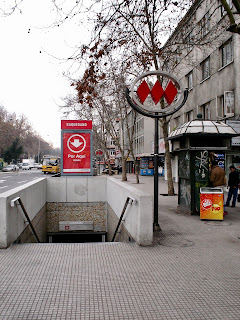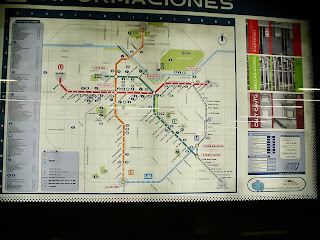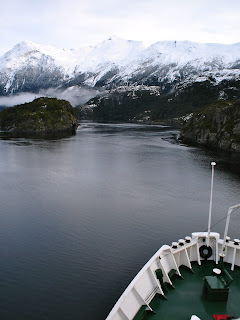Mendoza, Argentina: When I walked out the door at Casa Pueblo I had everything I owned with me; I wasn’t coming back. Inside the bus terminal the tsch-shhhh sound of air brakes and the P.A. system echoing off the ceiling were unchanged from the day I arrived, just like the snow on the mountain. With my ticket to the airport in hand, I loaded my duffle under the bus, embraced my guitar and took a seat. The fact that the bus was not full seemed a good omen. Maybe there would be empty seats on the flight to Santiago.
I have two guitars; one an expensive, concert, limited edition, Taylor acoustic that is too valuable to be dragged around South America. Several months before I left home, I was in Nashville, Tennessee, stopped at a prestigious if not famous, old guitar shop if for nothing more than to say I’d been there. I had been looking for a small, affordable guitar to take on my adventure but wasn’t shopping for it at the time. A pleasant young man approached and asked if he could help me. Not wanting to sound like a tourist, I defaulted to my need, looking for an affordable, parlor guitar; one I could take on a “Walk-about,” not believing anything in that shop would be in my price range.
Larivee Guitars is a high quality, Canadian guitar company from Vancouver. They had just upgraded both quality and materials, plus a big jump in prices on their parlor guitar line and the salesman had two of the older models left. Larivee’s recommended price was $1,099 but the store had them marked at $799 and his boss had put a %50 off tag on these two. He suggested I see how it felt, how is sounded. I resisted the urge momentarily, like not looking at the naked lady: you resist just enough to satisfy a flimsy, moral formality and then concede to the sin with a clear conscience. I strummed through a few bars, stumbled through some three finger roll and smoothed my hands over the finish. The fret board action was light and precise. For a small guitar its sound was warm and full. My salesman sensed that I was sold. “Which one do you want?” From the mahogany body and maple binding to the spruce top, they looked identical. Without a second thought I said, “You play them and pick the one you like best.” A good, Larivee hard case came with it. That’s how I came to have such a sweet little guitar on such an unpredictably, bumpy adventure. Traveling light out of Santiago in April, I realized I couldn’t manage the big, hard case. So I stored it with Juan and Olvia, along with my suitcase at Terra Australis. Then I picked up a cheap, soft gig bag for the road south.
Flying from Mendoza to Santiago, I didn’t know if they would allow it as a carry-on. Even such a short ride, checked with baggage I was afraid it would arrive damaged, even destroyed. Needless to say, I was a happy camper when they didn’t blink an eye. There were other guitars on board, squeezed between their owners legs; not a comfortable arrangement but after all, you sacrifice for the ones you love. Once off the runway we were thick in clouds, no classic view of the Andes but it was a short flight. You notice when the engines ease back and feel the change in angle of attack. Any traveler worth their salt knows that easy, idling sound of engines resting meant we were descending. Even a novice traveler would sense something earth bound when you hear the hum of wing flaps being applied and the clunk-clunk of landing gear folding down out of the wings. When we popped out of the muck we were on final approach, a minute later we were on the runway.
My guitars have names. The precious one left behind is La Perla, the pearl. I hadn’t settled on a name for the little Larivee until somewhere in mid-adventure. The parlor guitar would be, El Peregrino, the pilgrim. Rolling up to the gate in Santiago I anthropomorphized, spoke to my guitar as if it had ears: “El Peregrino, next time we fly you will be safely stored in your hard case.” It would not matter where they stowed him.
I didn’t have to pay the $200 ransom to get into Santiago this time. My point of origin was Mendoza, not Miami. After changing my Argentine currency back into Chilean pesos, I went outside to find a ride. My plan was to find a bed for the night, near the subway station where all of Juan’s walking field trips had begun. I told my taxi driver, “Un hostel cerca la estacion de Baquedano.” Baquedano Station was a main connector for the metro subway system. I knew the way back to Terra Australis and from there to my old haunts in Providencia. It was Saturday night and I would have to entertain myself on Sunday but I had the subway.
My chauffeur pulled up to the sidewalk in front of an older home in a middle class neighborhood. Long stairs led up to a covered porch, stone on the first floor and wood shingles up to the third floor attic. He had called ahead and they were expecting us. Two little old ladies, sisters, with a big house; another clandestine bed & breakfast. The exchange rate made $1 American equal to about 600 pesos so 7,000 pesos for the night wasn’t bad. She didn’t want me in the kitchen but said she would cook anything I brought from the mercado. My room was on the 2nd floor, at the top of the stairs and I was ready for a hot shower.
On the way, I had the driver go by Baquedano Station so I knew for sure how to get there. It was, maybe a 6 or 7 minute walk. With Sunday, plus three days before my flight on Thursday, I felt like I did the day before we flew out of Okinawa, back to California and separation from the Army. Just be where you are supposed to be and let it unfold.















